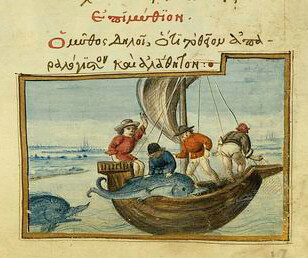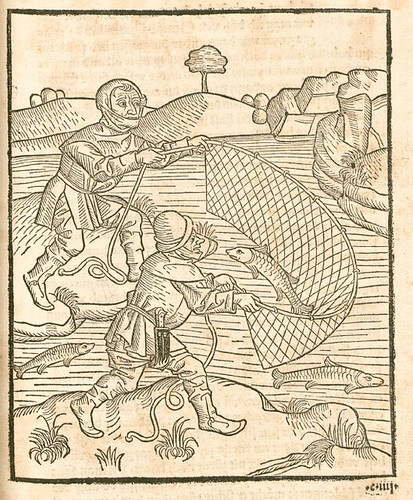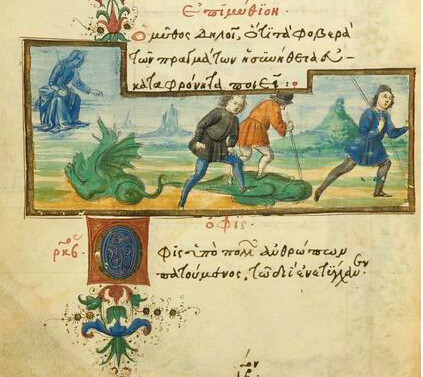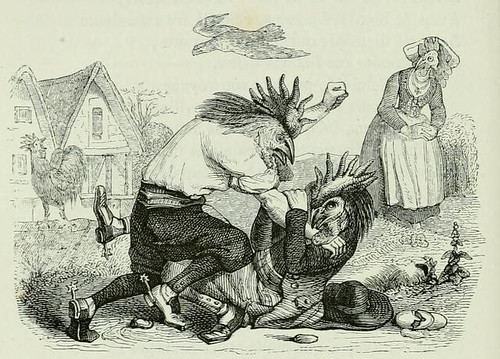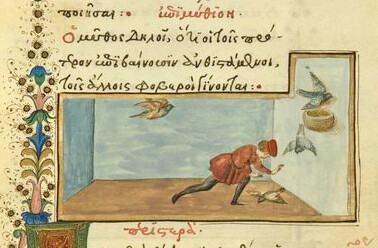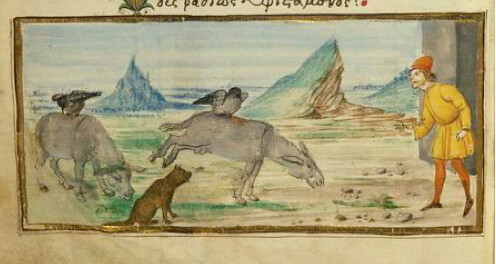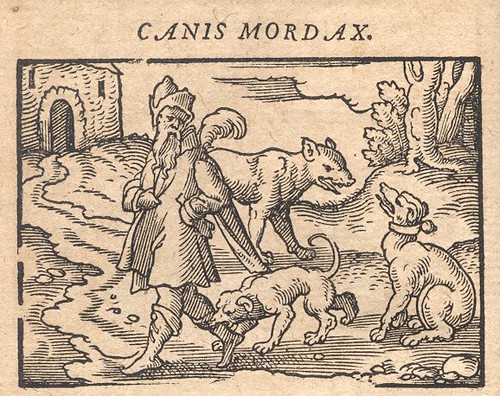Here is a round-up of today's blog posts - and for previous posts, check out the
Bestiaria Latina Blog archives. You can keep up with the latest posts by using the
RSS feed, or you might prefer to
subscribe by email. I'm Twittering again now at
Aesopus and
AesopusEnglish.
EVAN MILLNER'S AESOP. I'm sure many of you are familiar with Evan Millner's wonderful work with the Latinum podcast and his current work developing Latin videos at YouTube. He sent me a note today about his latest series of videos,
Lectiones Primae, which feature some Aesop's fables. Take a look/listen!
HODIE: pridie Kalendas Octobres (and yes, you can have your own
Roman Google Calendar).
VERBUM HODIERNUM: Today's word is
VIDEO - read a
brief essay about the word at the Verbosum blog. Here's one of the sayings you can find in the essay:
Aliud aliis videtur optimum, "To some people one thing seems best, to other people, some other thing."
MILLE FABULAE: New materials at the blog include
lots more illustrated fables, including this lovely illustration from the
Medici Aesop for a Fortuna fable. This is also where you can download your
free PDF copy of the
Mille Fabulae et Una book.
FABULAE FACILES: The new easy-to-read fable is
Musca et Quadrigae, the story of a fly with a very high opinion of himself.
PODCASTS: Today's Latin audio fable is
Cocleae et Puer , the story of the boy who was cooking some snails.
ENGLISH AESOP: Today's English fables are from
Sir Roger L'Estrange,
Wright's translation of La Fontaine and
Pratt's Aesop for children.
TODAY'S MOTTOES & PROVERBS:
Widgets available at SchoolhouseWidgets.com.3-Word Mottoes: Today's 3-word motto is
Secundum naturam vivo (English: I live according to nature).
3-Word Proverbs: Today's 3-word proverb is
Quod tuum, tene (English: Hold on to what is yours).
Rhyming Proverbs: Today's proverb with rhyme is:
Contra vim mortis non est medicamen in hortis (English: Against the power of death there is no remedy in the garden).
Vulgate Verse: Today's verse is
Stultus verba multiplicat (Ecc. 10:14). For a translation, check out the polyglot Bible, in English, Hebrew, Latin and Greek, at the
Sacred Texts Archive online.
Elizabethan Proverb Commentary: Here is today's proverb commentary, this time by Taverner:
Principium dimidium totius: The beginninge is halfe the hole. There be manie greate delayers. Longe they be ere they can be perswaded to set upon an honest act, so manie perils they cast. To morrow, to morrow they say wee will begin, but this to morrow is ever comming but never present, wherfore who so with good courage ventureth uppon his matters, hat alredy half done.
Today's Poem: Today's poem is from the rhyming couplets collected by
Wegeler, with a word list at
NoDictionaries.com:
Irritare canem noli dormire volentem,
Nec moveas iram post tempora longa latentem.
English: "Do not awake a dog who wants to sleep, and do not reawaken anger after it has been hidden for a long time." The wonderful rhymes here make this a very nice version of our more pedestrian "Let sleeping dogs lie" in English.
Today's image is Barlow's illustration for
829. Rusticus et Coluber. Rusticus repertum in altiori nive colubrum, frigore prope enectum, domum tulit et ad focum adiecit. Coluber, ab igni vires virusque recipiens et non amplius flammam ferens, totum tugurium sibilando infecit. Accurrit rusticus et, correpta sude, verbis verberibusque cum eo iniuriam expostulat, “Num haec est quam retulit gratia, eripiendo vitam illi cui vitam debuit?” (
source)









